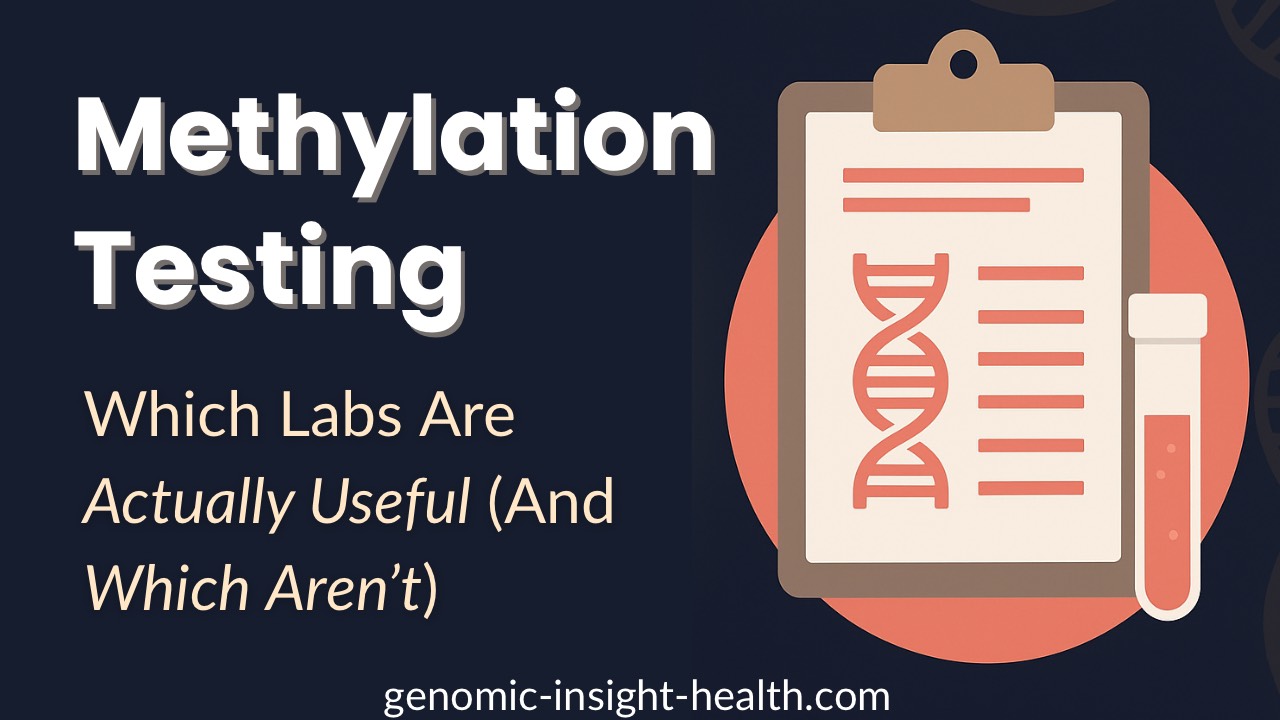Methylation Testing: Which Labs Are Actually Useful (And Which Aren’t)
Jun 21, 2025
Why Testing Methylation Isn’t One Simple Blood Test
One of the first things people ask after hearing about methylation is simple.
“Is there a blood test I can take to see if my methylation is working?”
The honest answer?
Yes. And no.
At least, not in the way most people expect.
Methylation Isn’t a Single Number You Can Measure
This is where most of the confusion starts.
Unlike cholesterol or blood sugar, where you get one clear number on your lab slip, methylation doesn’t work like that.
There isn’t one magic “methylation score” you can check.
Because methylation isn’t a single process.
It’s a network.
A series of dozens of nutrient exchanges, enzyme reactions, and feedback loops happening thousands of times per second in nearly every cell of your body.
You’re not testing a thing.
You’re trying to assess how that network is flowing.
What Testing Actually Shows You
While you can’t directly measure methylation in one number, you can measure:
- The raw materials feeding into methylation (folate, B12, choline)
- The byproducts produced (homocysteine, SAMe, SAH)
- The genetic blueprint influencing how efficient your pathways are (MTHFR, COMT, MAO, PEMT, DAO)
- And finally, your symptom patterns, which often reveal stress points long before labs fully catch up
In other words, methylation testing is more like triangulation.
You’re looking at multiple pieces that together start to tell you where your system may be running fast, slow, or struggling to keep up.
Genes Set The Blueprint, But Labs Show Real-Time Expression
This is one of the biggest mindset shifts I teach patients:
- Your genetics (MTHFR, COMT, MAO, and friends) show what your system is wired to be vulnerable to.
- Your labs show how that wiring is handling today’s load.
You need both to see the full picture.
Genetic Testing For Methylation
If you’ve already dipped your toe into methylation conversations online, you’ve likely seen the flood of gene acronyms.
MTHFR. COMT. MAO-A. PEMT. DAO. GST. SOD.
The list keeps going.
And that’s where a lot of people start feeling lost before they even order a test.
So let’s slow it down.
Genetic Testing Shows Your Blueprint
Genetic testing doesn’t tell you what’s actively happening inside your body right now.
Instead, it shows you how your pathways are wired to function.
Think of your genes like building permits:
- They don’t guarantee how efficient the system will run.
- But they show you where vulnerabilities or bottlenecks might exist.
- They give context for why certain supplements help, or why others backfire.
The Key Genes We Look At for Methylation
When evaluating methylation, I focus most on these systems because they interact with one another:
MTHFR (C677T, A1298C)
- Controls conversion of folate into usable methylfolate
- Influences homocysteine recycling
- Determines how easily your system creates methyl donors in the first place
COMT (V158M, H62H)
- Regulates dopamine, norepinephrine, and estrogen metabolism
- Strongly influences how your brain tolerates methyl donor input
MAO-A / MAO-B
- Break down serotonin, dopamine, and other neurotransmitters
- Affect mood sensitivity, pacing tolerance, and methylation speed
PEMT
- Impacts choline production and methyl group supply
- Relevant for liver detox, estrogen processing, and brain health
DAO & HNMT
- Control histamine breakdown
- Often influence methylation tolerance through nervous system sensitivity
GST, SOD, NQO1 (Detox Genes)
- Influence antioxidant defenses and detox load
- Indirectly place pressure on methylation by creating higher metabolic demand when impaired
Which Type of Genetic Testing Makes Sense?
While there are hundreds of direct-to-consumer genetic tests out there, most either:
- Give too little relevant data (basic ancestry-focused panels)
- Or overwhelm you with raw data you don’t know how to interpret
What tends to work best for real-world functional methylation planning:
- Panels like MaxGen Works Panel or other functional genomics labs that group genes by system function
- Tests that evaluate SNP combinations, not isolated markers
You want a test that helps you see patterns, not just gene names.
Genetics Show Potential — Labs Show Expression
Let’s say this again because it’s critical:
- Genetics tell you where your vulnerabilities sit.
- Labs (and your symptoms) tell you whether those vulnerabilities are currently active.
That’s why combining gene testing with real-time markers like homocysteine or B12 levels gives you the clearest picture.
Blood Markers That Reflect Methylation Function
Once you’ve seen your genetic blueprint, the next question is always:
“Okay, but what’s happening right now?”
This is where functional lab work helps fill in the real-world picture.
You’re not measuring methylation directly, but these markers reflect how well your system is handling its load.
Let’s break them down one by one.
A. Homocysteine — Your Most Direct Methylation Marker
If you only ran one lab to assess methylation status, this would likely be it.
Homocysteine sits right at the center of your methylation cycle.
It reflects how efficiently your body is recycling methyl groups back into methionine and downstream processes.
When homocysteine rises, it often signals:
- Folate deficiency (especially active methylfolate)
- B12 deficiency (methylcobalamin or hydroxocobalamin forms)
- MTHFR bottlenecks (slower folate conversion capacity)
- Detox stress (oxidative burden raising demand)
- Chronic stress and cortisol effects (increasing methylation strain)
Ideal ranges of homocysteine:
- Functional: 6.0–8.0 µmol/L
- Borderline: 9.0–11.0 µmol/L
- Elevated: Above 11.0 µmol/L
Homocysteine offers something many markers don’t:
It’s modifiable, trackable, and extremely responsive to targeted support.
B. Serum Folate & RBC Folate — Often Misleading
Folate levels confuse a lot of patients (and providers).
- Serum Folate: Reflects recent intake, but may look “normal” even when functional folate activity is poor.
- RBC Folate: Gives a slightly longer-term view of folate status inside red blood cells, but still isn’t perfect.
The problem with lab testing for folate?
- High folate on labs may simply reflect folic acid fortification or supplementation, not necessarily usable methylfolate.
- Some people have sky-high folate with methylation symptoms still present.
C. Vitamin B12 — Total vs Active B12
- Serum B12: Measures total circulating B12, but doesn’t reflect how much is actually being utilized.
- Holo-Transcobalamin (Active B12): A more accurate functional marker where available (though not always covered in routine labs).
Functional B12 deficiency can occur when:
- Serum B12 appears normal or high
- But active B12 utilization is impaired due to absorption or transport issues
D. SAMe / SAH Ratios — Advanced but Rarely Used
- Some specialty labs offer testing for SAMe and SAH (S-adenosylhomocysteine) levels.
- These reflect deeper methylation cycle intermediates but aren’t necessary for most patients.
In complex, unresolved cases, especially with psychiatric or neurological histories, they can offer extra insight.
The 80/20 Rule of Methylation Labs
For most people starting methylation support:
- Genetic Testing + Homocysteine + B12 status
- Covers about 80–90% of the most actionable information.
Everything beyond that is more troubleshooting territory, not necessary for initial planning.
Specialty Methylation Panels (Are They Worth It?)
This is where a lot of people get pulled off track.
They start researching methylation testing and quickly find expensive, glossy panels promising to map every single enzyme in the cycle.
You’ll see tests offering full “methylation pathway maps,” complete with dozens of markers you’ve never heard of.
And you start to wonder... “Do I need all of this to really fix my methylation?”
For most people starting out?
No.
Not even close.
When Specialty Panels Create More Confusion Than Clarity
The problem with some advanced methylation panels isn’t that the data is wrong.
It’s that most people don’t know how to interpret what they’re seeing.
You get:
- Dozens of partially understood SNPs
- Unclear clinical significance on minor variants
- No real guidance on which findings matter for your current symptoms
- An overwhelming amount of red and green “risk” markers that trigger unnecessary anxiety
More data does not automatically equal better outcomes.
When These Genetic Panels Might Actually Help
There are cases where advanced pathway panels can be useful, but typically only:
- When you’re working with a practitioner trained in methylation genetics
- When simpler interventions haven’t resolved your symptoms
- When you’re troubleshooting highly sensitive nervous system reactions
- In more complex psychiatric, fertility, or neurological cases where deeper layering is appropriate
For most people, you don’t need to start here.
Focus 80% of Your Early Testing on What Matters Most
If you want to invest your time, energy, and budget wisely:
- Genetic Testing: MTHFR, COMT, MAO, PEMT, DAO, detox genes
- Homocysteine (functional marker of methylation balance)
- Targeted nutrient markers (B12, folate, possibly methylation cofactors)
This combo gets you the vast majority of actionable data for real-world planning.
And in many cases, that’s all you need to make meaningful progress.
- Related: [Can You Over-Methylate? Signs You’re Taking Too Much Folate or B12]
- Related: [The Role of SAMe in Mood, Energy, and Detox]
When To Retest Your Labs
Once you start making changes, whether it’s adjusting your supplements, shifting your nutrition, or simply lowering your system’s overall load—the next question is almost always:
“When should I check my labs again?”
The short answer?
You have more flexibility than you think.
The goal is steady progress, not perfection.
Homocysteine: The Most Useful Marker to Track Over Time
Since homocysteine responds fairly directly to changes in methylation support, it becomes your easiest lab to monitor.
General retesting guidelines:
- Recheck every 3–6 months after making changes
- Allow at least 8–12 weeks after starting or adjusting supplementation before expecting meaningful shifts
- Don’t chase tiny fluctuations, watch for broader trends
What you’re looking for:
- Is your homocysteine trending toward that functional 6–8 µmol/L range?
- Are you seeing stabilization, not just of your lab number, but of your actual symptoms?
Symptoms Should Always Guide Your Personal Plan.
This is the part many people miss.
- Lab numbers give useful feedback.
- But how you feel always trumps small numerical changes.
If your energy is improving, sleep is stabilizing, mood feels calmer, and you’re tolerating supplements smoothly, you may not need constant lab monitoring.
Other Labs Don’t Require Constant Rechecking
- Genetic testing is typically done once.
- B12 and folate levels can be rechecked occasionally, especially if symptoms persist.
- SAMe or advanced methylation panels rarely need repeat testing for most people.
You’re not aiming for perfect lab scores.
You’re aiming for a nervous system that feels settled, resilient, and stable under daily life demands.
Testing Is a Tool — Not the Whole Story
If there’s one message I hope sticks with you, it’s this:
Labs are helpful.
But they aren’t the entire map.
Testing gives you data.
Your symptoms give you context.
And your daily lived experience gives you the real clues about how well your system is tolerating its current load.
Methylation Health Is Bigger Than Your Labs
Methylation touches:
- Energy
- Mood regulation
- Hormone balance
- Detoxification
- Immune sensitivity
- Histamine tolerance
These systems fluctuate daily based on:
- Stress
- Sleep
- Diet
- Inflammation
- Environmental exposures
You can’t see all of that in a single blood draw.
Symptom Patterns Often Reveal Imbalance Before Labs Do
- The patient with normal homocysteine who still feels overstimulated on methylfolate.
- The person with “perfect” B12 levels who struggles with nerve tingling.
- The exhausted client who shows stable labs but lives under chronic stress load.
This is why real-world methylation support isn’t built on lab numbers alone.
It’s built on watching your system’s actual behavior when you make changes.
Genetics + Labs + Symptoms = The Full Picture
- Genetics show your blueprint.
- Labs show your current state.
- Symptoms show your system’s real-time response.
When you use all three, you build:
- A plan that adjusts as your life changes
- Flexibility to tolerate minor fluctuations without panic
- A much steadier long-term result that fits your actual biology
- Related: [20 Symptoms That May Point To A Methylation Imbalance]
- Related: [Histamine Intolerance: The Full Genetic Guide To DAO, HNMT, and Symptoms]
Where To Go From Here
You don’t need $2,000 in specialty testing to support your methylation health.
You need the right information.
At the right time.
In a way your system can actually handle.
Methylation testing, when approached thoughtfully, helps you stop guessing.
But it’s never about chasing perfect numbers.
It’s about building a plan that fits your biology today and adjusts as life inevitably shifts.
Download Your Free Methylation Lab Cheat Sheet
[Download PDF] - Coming soon!
Inside you’ll get:
- The core labs that actually reflect methylation function
- Ideal functional ranges (not just “normal” ranges)
- How to layer labs with symptoms for better context
- A simple decision tree to guide your next steps
This cheat sheet helps you avoid unnecessary tests and focus on what matters most.
Order Functional Genetic Testing (If You Haven’t Yet)
[Order the MaxGen Works Panel]
Genetic testing gives you:
- The blueprint behind your system’s unique wiring
- Insight into MTHFR, COMT, MAO, DAO, PEMT, detox genes, and more
- A foundation to personalize supplement pacing, dosing, and order of operations
When you pair your labs with your genes, you stop throwing supplements at symptoms and start understanding your system’s real needs.
Already Have Labs or Genetics? Let’s Build Your Full Methylation Plan
[Book a 1:1 Genetic Consult — Coming Soon]
Inside your consult, we’ll walk through:
- Your current labs
- Your SNP combinations
- Your pacing tolerance
- How to sequence your supplements (or pull them back if needed)
The goal isn’t more protocols... it’s clarity.
Continue Learning — Full Methylation Series
- [MTHFR & Methylation: The Complete Guide]
- [20 Symptoms That May Point To A Methylation Imbalance]
- [Methylfolate vs Folic Acid: What’s Safer For MTHFR?]
- [How Homocysteine Affects Your Heart, Brain, and Hormones]
- [Can You Over-Methylate? Signs You’re Taking Too Much Folate or B12]
- [The Role of SAMe in Mood, Energy, and Detox]
- [COMT, MAO & Mood Regulation] - Coming soon!
One Final Reminder
You’re not trying to outsmart your genes.
You’re learning how to work with them.
And that’s when methylation support finally becomes sustainable, because it actually fits your biology.


